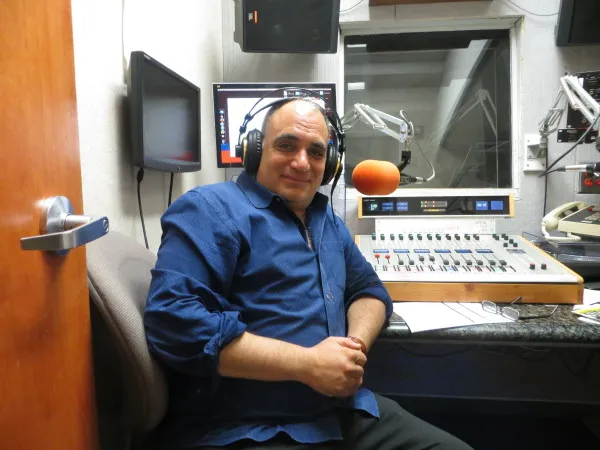
A full-time lecturer in the Arabic program at Stanford, Dr. Ramzi Salti shares his passion for the Arabic language and culture through radio with an audience that reaches far beyond Stanford’s campus. Salti’s radio show, “Arabology,” airs weekly on KZSU 90.1 FM and streams live online. The Daily sat down with Salti to discuss his motivations for broadcasting “Arabology” and to learn about his experiences at KZSU.
The Stanford Daily (TSD): Can you tell me more about how you started your radio station?
Ramzi Salti (RS): I’ve been teaching Arabic here at Stanford for 17 years, and for the first, let’s say 14 years, I was teaching language and trying to teach culture through the classroom. But I would always get asked about Arabic music, culture, [and] cultural productions. Americans who didn’t know Arabic wanted to know what that music was about, especially when it came to the music of the Arab Spring. Americans would watch television, would see what’s going on in Egypt and in Tunisia and these revolts going on against the government, and not understand what the people were singing. That’s what began my exploration into the ways in which I could make that music accessible to American listeners. And I thought, why not do it through the radio?
I was inspired by a couple of other faculty members here who had radio shows. It began as a little hobby that I did after I finished teaching. I would head over to KZSU Stanford 90.1 FM in the basement of Memorial Auditorium, put my headphones on and speak to the Bay Area about Arabic music. And the response was amazing. I thought maybe two people would listen. [But] apparently people liked what they heard. I comment in English about the music I play in Arabic, so even though [the song] is in Arabic, you feel it. That’s what led to my decision to make it a regular show.
TSD: What is the goal of the show?
RS: As the show grew, so did the number of artists and musicians who sent me their stuff. So every week I look at my email, and I see young people in difficult circumstances. Music becomes healing for them. And they send me that music, and I play it on KZSU. Can you imagine their reactions? They tweet and [post on] Facebook, ‘My song that I created in the garage with my two friends while we were being shelled by airplanes aired on KZSU Stanford in California.’ The fact that I [am] able to give them that outlet, that through my little show I [am] able to let their voice reach a wider audience is the biggest satisfaction of my life, and it’s what keeps me going.
TSD: Do you just play music from contemporary Arabic artists?
RS: When I started at KZSU, Professor Joel Beinin, who teaches history here, had a show called “Mediterraneans”; he inspired me to do my show. “Mediterraneans” concentrated on the classics, the traditional songs. I didn’t want to just do a similar show, so I [thought] ‘What could make my show a little bit different?’ I [decided] that my show would be about new Arabic music: hip-hop, jazz, rap, opera. It’s about indie and alternative Arabic music. I don’t think there are that many shows that concentrate on alternative music coming in from the Arab world. There’s tons of talent there, and it’s not represented. My show will be their mouthpiece.
It started with me going to the artists, and now, five years later, I’m getting regular ‘deliveries’ from artists around the world. I try to play new artists as much as possible, and it’s not up to me to judge whether they’re good or bad. I just like to put it out there and see how the audience responds. If we get quite a bit of responses, then yes, we’ll be seeking more songs from that group. And if we don’t, at least we gave them a chance to play their song on the air. [I’ve had] very positive responses in general, and very excited responses from listeners who want to discover more Arabic music.
TSD: Where do you see the show going in the future?
RS: The show goes where the music goes; meaning, [toward] what is going on right now in the Arab world. When there were all these revolts that we called the Arab Spring, the show took a turn into hip-hop and music that was very political, very powerful. And so I found myself taking the show into that realm: politics, a lot of Arab Spring music, interviewing guests who were involved in the uprisings. Right now, the Arab Spring, to me, has turned into a little bit of an Arab Winter. I don’t think it’s the end of the struggle. Arab Winter will turn into Summer and then maybe Spring again. But right now the music is taking me more into human rights, [centering] on feminist issues, LGBT rights … that’s the type of music that is coming out now. Young people are disillusioned with what has happened all over the Arab world. They’re disappointed, so the music now is a sad kind of music that laments the state of the Arab Spring, but that talks about human rights and trying to get everybody included.
This interview has been condensed and edited.
Contact Andrea Villa at [email protected].